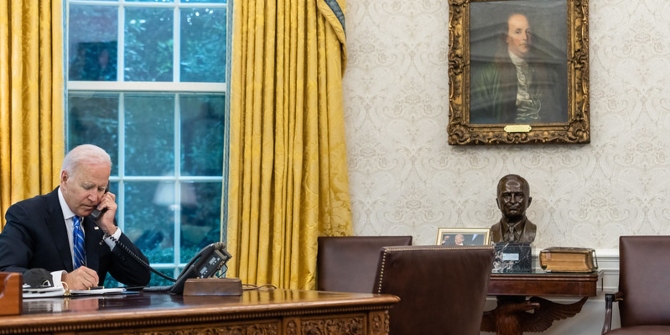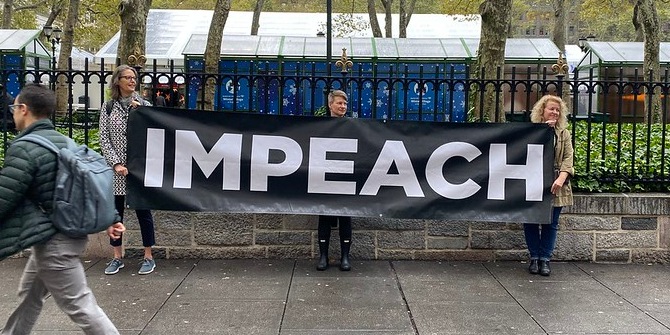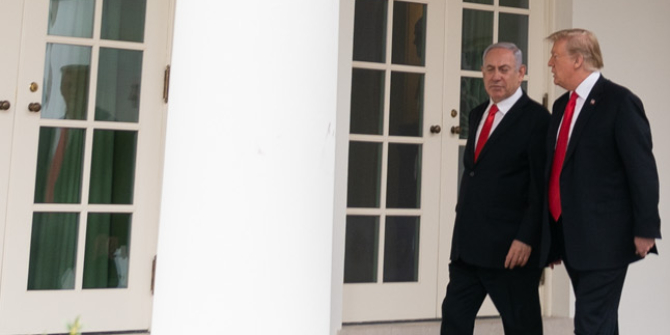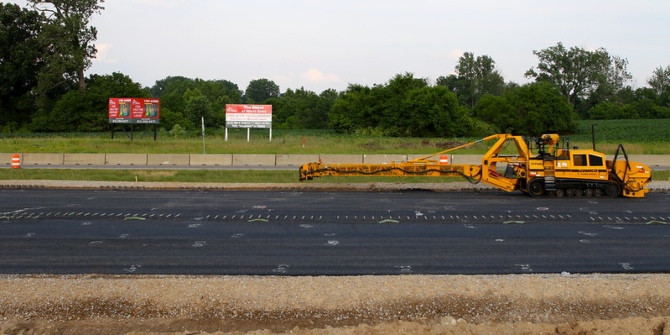 The House Select Committee to Investigate the January 6th Attack on the United States Capitol is airing eight public hearings this summer before releasing a final report in September. Julie Norman explains why the hearings are taking place, why they matter, and what outcomes we might expect.
The House Select Committee to Investigate the January 6th Attack on the United States Capitol is airing eight public hearings this summer before releasing a final report in September. Julie Norman explains why the hearings are taking place, why they matter, and what outcomes we might expect.
What is the committee and why is it holding hearings?
The House Select Committee was created in June 2021 to investigate the 6 January 2021 attack on the US Capitol, after a proposal to form a full Congressional Commission (like that established after 9/11) was defeated in the Senate.
House select committees are created to investigate specific issues over a finite period of time, and typically include members of both parties. The committee investigating January 6th is comprised of seven Democrats and two Republicans, including Chairman Bennie G. Thompson (D-MS) and Vice Chair Liz Cheney (R-WY).
The committee has spent the past year conducting over 1,000 interviews and reviewing over 125,000 documents to investigate the events of the January 6th attack. While investigations are typically about gathering new information, the purpose of hearings is to present that information. As such, the aim of the public hearings is to present the key findings of the committee’s investigation to the American people.
What should we expect?
The first prime-time hearing, held on 9 June, included statements from committee members, live oral testimonies, clips from previously recorded interviews and depositions, and unreleased footage from January 6th.
As expected, most of the focus was, and will continue to be, on former President Donald Trump. Committee members argued that the attack at the Capitol was not spontaneous, but rather represented the culmination of Trump’s “sophisticated seven-part plan to overturn the presidential election and prevent the transfer of presidential power.”
The “parts” of this plan are expected form the basis of the upcoming hearings, with topics including Trump’s claims of election fraud; his pressure on state officials, Vice President Mike Pence, and Department of Justice personnel; and his encouragement to supporters to challenge the election results.
Will Trump face criminal charges?
Committee members have referred to Trump’s actions as “illegal” and “unconstitutional”, and some lawyers see the hearings as building a “credible criminal case” for conspiracy to commit fraud and/or obstruction of the proceedings of Congress.
But the hearings are not a trial–there is no defense, cross-examination of witnesses, or testing of evidence– and the committee is not a judicial body. As such, it is not the role of the committee to find Trump guilty or not guilty.
The most the committee can do procedurally is make a referral to the Department of Justice (DOJ) to pursue a criminal case, but such a recommendation is not binding and carries minimal weight. Indeed, if viewed as overly politicized, such a referral could make it more difficult for the DOJ to pursue a criminal investigation. Committee members may thus hope that the evidence speaks for itself to sway Attorney General Merrick Garland and his team, rather than issuing a formal referral.
With or without the committee’s insights however, it is unclear if the DOJ would pursue the case. The DOJ has arrested over 840 defendants in relation to January 6 but has resisted pressure to comment on Trump. Even if the committee constructs a viable narrative implicating Trump, the legal threshold for proving intent for conspiracy is much higher.
Moreover, the desire for accountability would need to be balanced against the potentially dangerous precedent of a new administration prosecuting a former president, especially in an era of already extreme polarization.
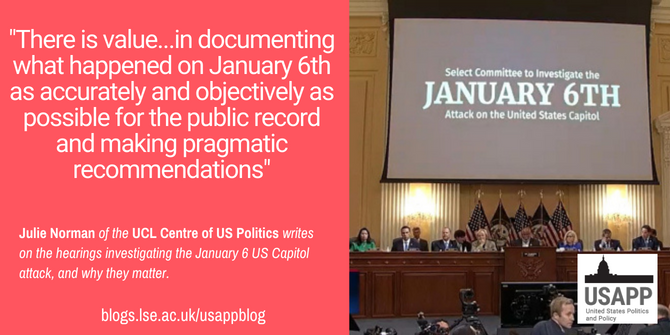
Credit: C-SPAN
What are other possible outcomes?
Whereas prosecution is generally outside Congress’ remit, legislation is well within it. Thus, it is likely that the hearings will give further impetus to procedural changes that are already underway, specifically in revising the Electoral Count Act (ECA) of 1887, which establishes how electoral votes for president are counted and confirmed in Congress.
A bipartisan group of senators is already working to update the ECA to prevent attempts like those used by Trump to exploit loopholes. For example, a revised ECA would affirm the vice president’s role as purely ceremonial to avoid pressure like that put on Pence to reject the results. Challenges to states’ slates of electors would also be raised to higher thresholds to prevent sole objectors.
Such changes would not plug all the gaps exploited by Trump, especially at the state level, and the potential ECA revisions are not contingent on the hearings. But it is one of the more realistic bipartisan outcomes to expect as a response to the committee’s findings.
What will be the broader political impact?
Polls indicate that while 70 percent of Americans think it is important to determine what happened on January 6th, less than half of Republicans do. Further, 60 percent of Republicans believe that there was widespread fraud in the election, and nearly one in four approve of the actions of those who entered the Capitol.
Members of the committee no doubt hope to shift that needle, even marginally, by underscoring the severity of the threat to democracy witnessed on January 6. But they are up against a double challenge of polarization and fatigue among voters that will be difficult to crack, especially as Trump’s allies have framed the hearings as a partisan effort to damage him and his supporters, or as a distraction from inflation and other issues.
Committee members and their supporters, especially Democrats, should thus be clear-eyed about the challenges of reaching those they most seek to persuade, much less changing minds, at least in the short term. But there is value nonetheless in documenting what happened on January 6th as accurately and objectively as possible for the public record and making pragmatic recommendations that seek to prevent it from happening again.
Please read our comments policy before commenting.
Note: This article gives the views of the author, and not the position of USAPP– American Politics and Policy, nor of the London School of Economics.
Shortened URL for this post: https://bit.ly/3xiH0SU
About the author
 Julie Norman – UCL Centre of US Politics
Julie Norman – UCL Centre of US Politics
Julie Norman (@DrJulieNorman2) is Co-Director of the UCL Centre on US Politics (@CUSP_ucl) and Lecturer in Politics and International Relations at UCL.


